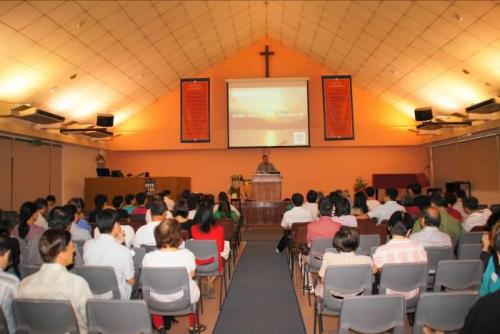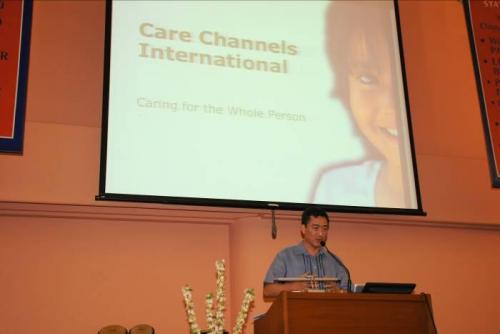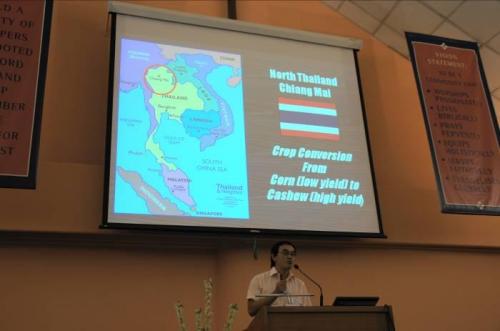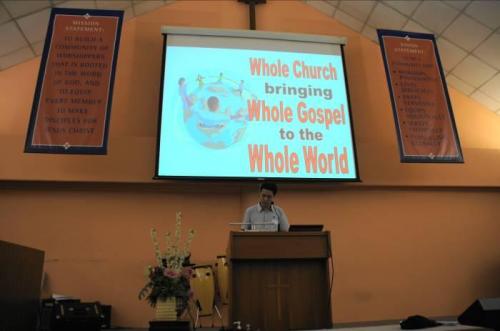Report on Consultation 10 - Business as Missions
“Business as missions is not tithing business profits for missions. The business itself is missions,” said Elder Yeap Eng Hooi in his opening remarks as Chairman of the English Presbytery Missions Committee at Missions Consultation #10 held on 19 February 2011. “Professional skills can be used in the mission field.”

How, then, can business be used as a platform for missions work?
In a fascinating presentation, the speaker Mr Yeoh Seng Eng, Executive Director of Care Channels, deftly illustrated how a flower farm project in the Philippines provided opportunities for evangelism while providing a means of sustained livelihood to 700 families who used the harvested flowers to produce craft-work for sale. During “value formation” weekly meetings, university students recruited for flower harvesting discussed not only flowers, but also engaged in talks about values and bible stories. A holiday camp for these university students created another avenue to share the Bible with them.

Encouraged by the success of the flower farm, Care Channels were able to launch other projects which include a goat farm and the growing of moringa and lemon grass. These business ventures were an integral part of a holistic package covering livelihood programs, medical/health and education sponsorship in the Philippines.
“The heart of missions is not just caring for the soul, but also caring for the whole person,” said Seng Eng. Thus, a similar holistic approach was adopted in East Asia, Pakistan, Indonesia and Timor Leste. In one country, for example, plans to establish an elementary school would give good value in helping the needy and present an effective channel for reaching out to non-Christians.
Empowerment, caring for the whole person and sustainability were also the common threads in the sharing by Preacher William Heng. “In order to carry out successful, sustainable missions trips, we need to empower the local people so as to enable them to live above the poverty line, tithe to the church and support the local pastor as well as evangelise the local community,” said William.

It was enlightening to hear from William on how two mission models – business and community projects – could be integrated. This involved strategies for CP4CP (Community Projects for Church Planting) through a cashew-planting project in Baan-Orn, a tribal village to the north of Chiang Mai in Northern Thailand.
Responding to a question from the floor, William shared on a typical week in a short-term mission trip to Baan-Orn. Activities included mobile clinic and health talk, visitations of non-Christian patients, and vacation bible school. There was also a half-day spiritual retreat for the missions team to reflect on the experiences and to be challenged to a greater involvement in God’s work.
Rev Edwin Wong approached the topic from a different angle and his sharing provided much food for thought. Using the tag line “Whole Church bringing Whole Gospel to the Whole World” used at the 3rd Lausanne Congress on World Evangelism, Edwin elucidated the key biblical principles for evangelism and mission work in the marketplace. He touched briefly on what the three phrases meant and urged churches to be more strategic and visionary in mobilizing God’s people for missions.

Rev Edwin’s challenge to the 80-strong audience was pertinent for those who may not be directly engaged in business as missions: “What does God’s Word have to say about your work?” His sharing served as an apt reminder that our office culture, our corporate core values and the quality of the products/services of our organisation did matter to God. Undoubtedly, our lives and relationships must demonstrate the practical implications of God’s Word.
In a nutshell: Every Christian has a mission to be engaged in missions work, whether through a business project overseas or in the local marketplace.
By Sio Suat Kheng, Bethel Presbyterian Church
